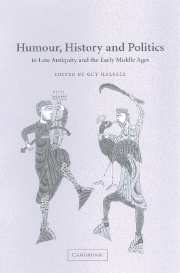Book contents
- Frontmatter
- Contents
- Notes on contributors
- Preface
- List of abbreviations
- Introduction: ‘Don't worry, I've got the key’
- PART I THE FATE OF HUMOROUS WRITING
- 1 Laughter and humour in the early medieval Latin west
- 2 Humour and the everyday in Byzantium
- PART II HUMOUR AND THE POLITICS OF DIFFERENCE
- PART III HUMOUR, HISTORY AND POLITICS IN THE CAROLINGIAN WORLD
- Index
2 - Humour and the everyday in Byzantium
Published online by Cambridge University Press: 24 July 2009
- Frontmatter
- Contents
- Notes on contributors
- Preface
- List of abbreviations
- Introduction: ‘Don't worry, I've got the key’
- PART I THE FATE OF HUMOROUS WRITING
- 1 Laughter and humour in the early medieval Latin west
- 2 Humour and the everyday in Byzantium
- PART II HUMOUR AND THE POLITICS OF DIFFERENCE
- PART III HUMOUR, HISTORY AND POLITICS IN THE CAROLINGIAN WORLD
- Index
Summary
In its simplest form, humour can be defined as a stimulus that generally produces what psychologists and physiologists call ‘the laughter reflex’, although the picture is actually more complex than this. However, there are as many different cultural forms of this stimulus as there are human societies. Furthermore, there are several paradoxes to be confronted when considering the nature of humour and laughter. One is quite simply that the so-called laughter reflex has no apparent biological purpose: its only generally agreed function is to provide relief from tension (although one could count this as a biological function, too) – and the point about humour, of course, is that it consists precisely in the deliberate or accidental creation of a context in which tension of one sort or another can be built up and then dissipated. This can be done quickly, through the format of the standard joke; or at length, in the form of satire or parody; or a combination. Another paradox about laughter is that it is a very complex physiological response – it actually involves the co-ordinated contraction of some fifteen facial muscles as well as altered respiratory patterns – but has no obvious physiological origin: telling an amusing story, and generating humour, is a cultural phenomenon.
- Type
- Chapter
- Information
- Publisher: Cambridge University PressPrint publication year: 2002
- 3
- Cited by



